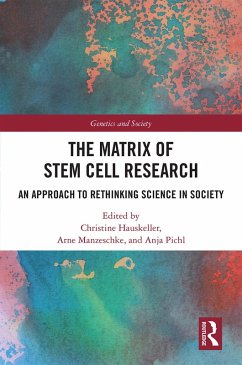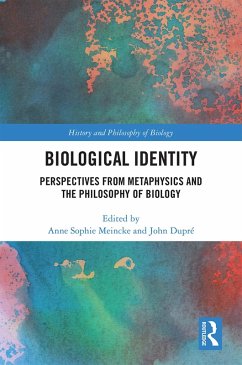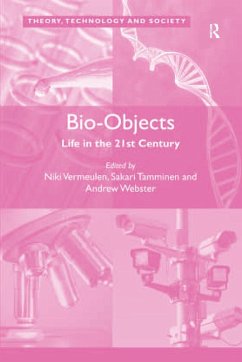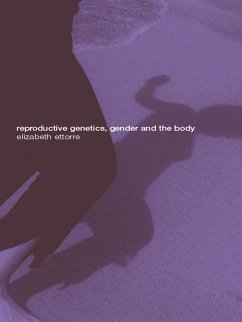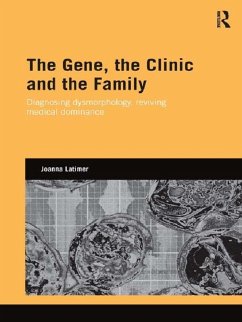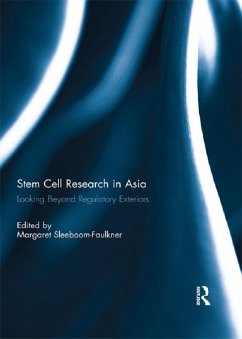
The Matrix of Stem Cell Research (eBook, PDF)
An Approach to Rethinking Science in Society
Redaktion: Hauskeller, Christine; Pichl, Anja; Manzeschke, Arne
Versandkostenfrei!
Sofort per Download lieferbar
43,95 €
inkl. MwSt.
Weitere Ausgaben:

PAYBACK Punkte
22 °P sammeln!
Stem cell research has been a problematic endeavour. For the past twenty years it has attracted moral controversies in both the public and the professional sphere. The research involves not only laboratories, clinics and people, but ethics, industries, jurisprudence, and markets. Today it contributes to the development of new therapies and affects increasingly many social arenas. The matrix approach introduced in this book offers a new understanding of this science in its relation to society. The contributions are multidisciplinary and intersectional, illustrating how agency and influence betw...
Stem cell research has been a problematic endeavour. For the past twenty years it has attracted moral controversies in both the public and the professional sphere. The research involves not only laboratories, clinics and people, but ethics, industries, jurisprudence, and markets. Today it contributes to the development of new therapies and affects increasingly many social arenas. The matrix approach introduced in this book offers a new understanding of this science in its relation to society. The contributions are multidisciplinary and intersectional, illustrating how agency and influence between science and society go both ways.
Conceptually, this volume presents a situated and reflexive approach for philosophy and sociology of the life sciences. The practices that are part of stem cell research are dispersed, and the concepts that tie them together are tenuous; there are persistent problems with the validation of findings, and the ontology of the stem cell is elusive. The array of applications shapes a growing bioeconomy that is dependent on patient donations of tissues and embryos, consumers, and industrial support. In this volume it is argued that this research now denotes not a specific field but a flexible web of intersecting practices, discourses, and agencies. To capture significant parts of this complex reality, this book presents recent findings from researchers, who have studied in-depth aspects of this matrix of stem cell research.
This volume presents state-of-the-art examinations from senior and junior scholars in disciplines from humanities and laboratory research to various social sciences, highlighting particular normative and epistemological intersections. The book will appeal to scholars as well as wider audiences interested in developments in life science and society interactions. The novel matrix approach and the accessible case studies make this an excellent resource for science and society courses.
Conceptually, this volume presents a situated and reflexive approach for philosophy and sociology of the life sciences. The practices that are part of stem cell research are dispersed, and the concepts that tie them together are tenuous; there are persistent problems with the validation of findings, and the ontology of the stem cell is elusive. The array of applications shapes a growing bioeconomy that is dependent on patient donations of tissues and embryos, consumers, and industrial support. In this volume it is argued that this research now denotes not a specific field but a flexible web of intersecting practices, discourses, and agencies. To capture significant parts of this complex reality, this book presents recent findings from researchers, who have studied in-depth aspects of this matrix of stem cell research.
This volume presents state-of-the-art examinations from senior and junior scholars in disciplines from humanities and laboratory research to various social sciences, highlighting particular normative and epistemological intersections. The book will appeal to scholars as well as wider audiences interested in developments in life science and society interactions. The novel matrix approach and the accessible case studies make this an excellent resource for science and society courses.
Dieser Download kann aus rechtlichen Gründen nur mit Rechnungsadresse in A, B, BG, CY, CZ, D, DK, EW, E, FIN, F, GR, HR, H, IRL, I, LT, L, LR, M, NL, PL, P, R, S, SLO, SK ausgeliefert werden.




